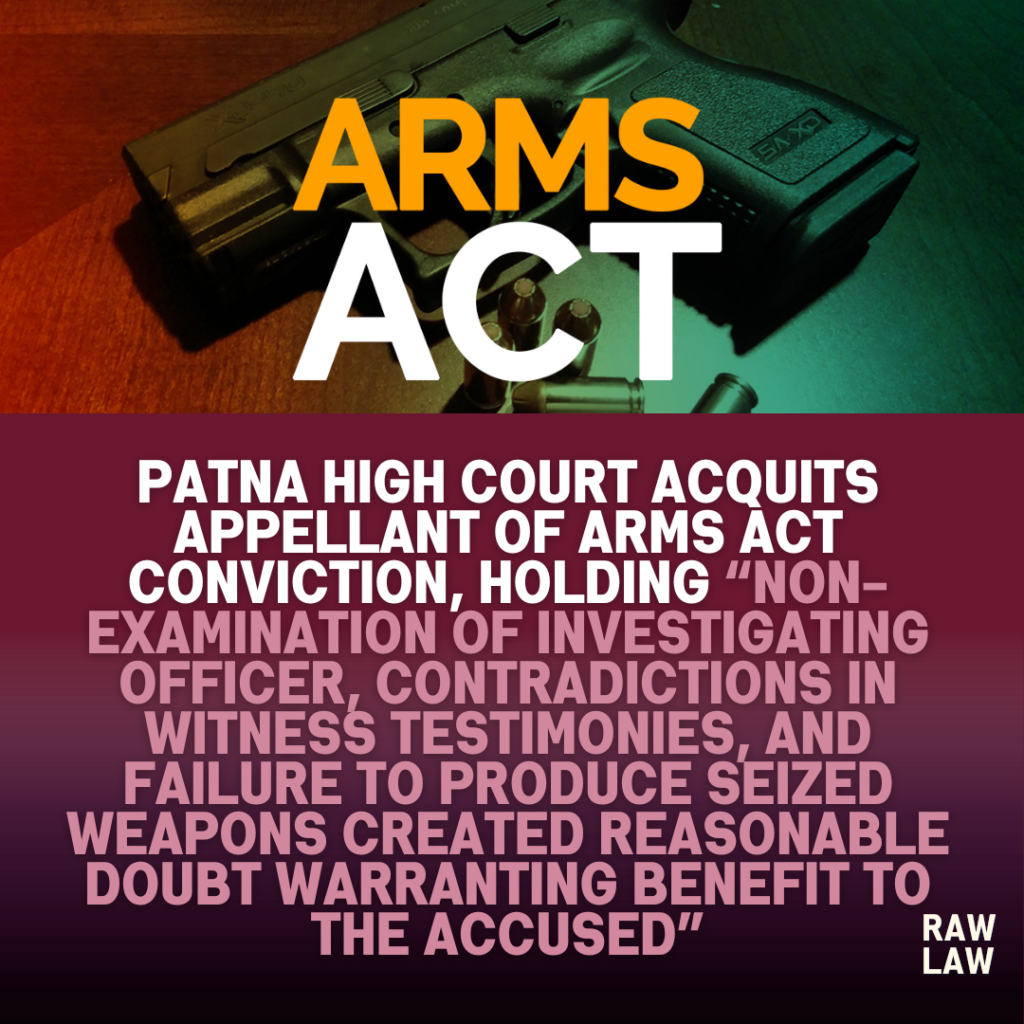Court’s Decision
The Patna High Court allowed the appeal, set aside the conviction and eight-year sentence under Section 25(1-AA) of the Arms Act, and acquitted the appellant, holding that non-examination of the Investigating Officer, failure to produce seized weapons, and contradictions in the prosecution’s evidence created reasonable doubt in the prosecution case. The appellant was discharged from bail bond liability.
Facts
The case arose from an alleged raid by Tekari Police in Gaya district on 9 July 2003 based on secret information that the appellant and his co-accused were manufacturing and supplying illegal arms to extremist groups. The police claimed to have raided the appellant’s house, recovering incomplete sten guns, firearm parts, and tools, preparing a seizure list on the spot with witnesses. The appellant was convicted in 2006 by the trial court under Section 25(1-AA) of the Arms Act, sentenced to eight years rigorous imprisonment, and fined Rs. 5,000.
Issues
- Whether the conviction under Section 25(1-AA) of the Arms Act could be sustained when the Investigating Officer was not examined.
- Whether contradictions regarding the date, time, place of recovery, and seizure of weapons created reasonable doubt.
- Whether the non-production of seized arms in court was fatal to the prosecution case.
Petitioner’s Arguments
The appellant contended:
- There was non-examination of the Investigating Officer, which was fatal to the prosecution case.
- Contradictions existed regarding the date of the raid, with PW-5 stating it occurred on 2 July 2003 while others stated 9 July 2003.
- Discrepancies existed regarding the place of recovery, with PW-6 mentioning recovery from a bag thrown by a fleeing person, contradicting claims of seizure from the appellant’s house.
- Seized articles were not sealed and were not produced before the court.
- Independent seizure witnesses (PW-1 and PW-2) turned hostile, denying recovery in their presence.
- These issues cumulatively created reasonable doubt warranting acquittal.
Respondent’s Arguments
The State argued:
- The trial court’s judgment was based on consistent evidence from police witnesses, confirming the raid, seizure, and recovery of illegal arms.
- Non-examination of the Investigating Officer was not fatal as per Munna Lal v. State of UP, where credible ocular testimony can sustain conviction despite defective investigation.
- The contradictions were minor and did not undermine the case.
Analysis of the Law
The Court analysed:
- Under Habeeb Mohammad v. State of Hyderabad, the non-examination of material witnesses, including the Investigating Officer, can prejudice the accused and render the trial unfair.
- In Munna Lal v. State of UP, while defective investigation is not always fatal, non-examination of the Investigating Officer creates material lacunae where the evidence of other witnesses is not wholly reliable.
- Under criminal jurisprudence, the prosecution must prove its case beyond reasonable doubt, and benefit of doubt must go to the accused where contradictions and procedural lapses exist.
Precedent Analysis
- Habeeb Mohammad v. State of Hyderabad (1954 AIR 51): Non-examination of material witnesses can prejudice the accused.
- Munna Lal v. State of UP (2023 SCC OnLine SC 80): While defective investigation alone is not fatal, non-examination of the IO can create material gaps where prosecution evidence is inconsistent.
- Applied these principles to conclude that the lack of IO testimony and unproduced seized articles created serious doubt.
Court’s Reasoning
The Court noted:
- Contradictions in the prosecution evidence regarding the date, time, place, and manner of recovery.
- The non-examination of the Investigating Officer deprived the court of evidence critical for corroborating the investigation’s integrity.
- Failure to produce the seized arms before the court was fatal to the prosecution’s case, especially under the Arms Act where the nature of the weapon is critical for conviction.
- Independent witnesses did not support the prosecution’s seizure claims, and the police witnesses’ testimonies contained contradictions.
- These issues collectively created reasonable doubt in the prosecution’s case.
Conclusion
The Patna High Court:
- Set aside the trial court’s conviction and sentence under Section 25(1-AA) of the Arms Act.
- Acquitted the appellant and discharged him from all bail bond liabilities.
- Directed the High Court Legal Services Committee to pay honorarium to the amicus curiae for assistance in the matter.
Implications
- Reinforces the criticality of examining the Investigating Officer in criminal trials.
- Highlights the importance of producing seized articles in court in Arms Act cases.
- Establishes that contradictions in evidence and procedural lapses can create reasonable doubt warranting acquittal.
Referred Cases and Their Relevance
- Habeeb Mohammad v. State of Hyderabad: Non-examination of IO can prejudice the accused.
- Munna Lal v. State of UP: When prosecution evidence is inconsistent and uncorroborated, non-examination of IO can be fatal.
FAQs
Q1: Is non-examination of the Investigating Officer fatal to the prosecution case?
Yes, especially where the IO’s testimony is crucial to corroborate investigation details and there are inconsistencies in evidence.
Q2: Can a conviction under the Arms Act be sustained without producing seized weapons in court?
No, production of seized arms is critical in Arms Act cases, and failure to do so can be fatal to the prosecution.
Q3: Can contradictions in witness testimonies lead to acquittal?
Yes, if the contradictions are material and create reasonable doubt regarding the prosecution’s version.



